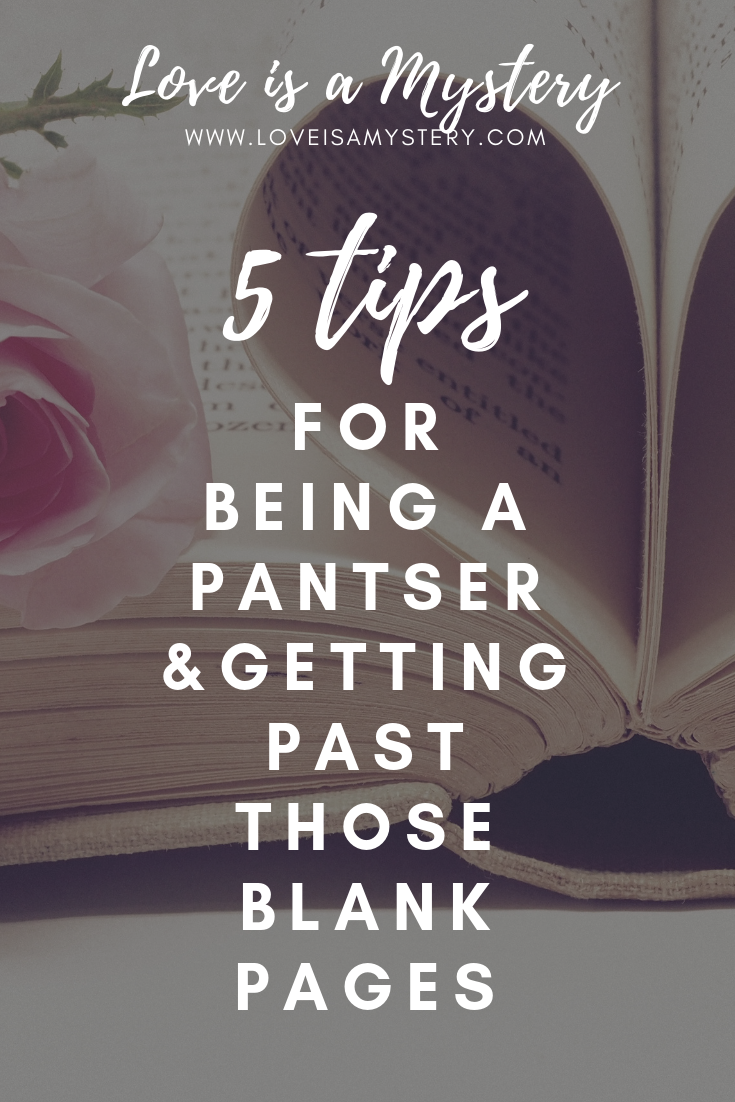
by Angela Smith | Sep 24, 2018 | Writing
What’s worse than staring at a blank page? Staring at a page that has a few words on it but you have no idea what will happen next.

Staring at a blank page and wondering what to write next is definitely not rosy.
Ah, the life of a pantser. One who doesn’t plot or plan their story but starts writing first. It’s not something I love. Believe me, I’ve changed my ways and tried to plot and it rips apart my motivation for that particular story unless and until I am about halfway through, when I finally stop writing to plot a little. I’m sure it’s the same way for a plotter. How could they ever sit down and write without knowing where the story is going?
Being a pantser to me means trusting your character to tell you where to take the story. It’s tough. There’s often a battle when I’m not sure I understand the character. I often ask: “Why in the world would you do that?” Especially with my current work-in-progress. The heroine keeps surprising me, but if I don’t do what she says I will get stuck. Believe me, I know because I have been in that position. And it sucks.
Then again, it’s always whatever work-in-progress I’m writing at the time that is giving me problems.
And although it sounds miserable (it often is) it’s also one of the most satisfying moments of my writing. I start out, I write, and I have no idea what’s going to happen. It’s even better when I’m hit with a sudden idea and can’t write it down fast enough. Unfortunately for me, that’s rare.
But oh, these characters I’m writing now. As a writer who pants and rarely plans, I’ve learned you often have to woo your character to come out of “hiding” and speak to you.
So how do I do that?

If you’ve seen my blog, you know how much I love character development. Most of my character development goes far above and beyond what I’ve shared. It’d probably bore you to tears if I shared it all. The interview questions, the dossiers, the photo collages that I create until I finally create a small “cheat sheet” that you might have seen on my blog. To me, that’s my plotting. My characters often change from my original creation, but that’s my way of plotting.
“Character development, to me, is my way of plotting.”
Just write. If you saw my first draft of my first few scenes in my current WIP, all you’d see is a lot of dialogue. I don’t have emotion or even setting at this point. I’m focused on the characters and action. Rewriting is where I’ll go in and add all the layers, the action, setting, emotion, even dialogue tags. At this point, because it’s a new story, I can’t try too hard. These characters are still shy and don’t trust me to tell their story yet. (Yes, that probably sounds cuckoo to non-writers, but it is the way things are.)
“These characters are still shy and don’t trust me to tell their story yet.”
The other day, I got a thrill when I saw Sandra Brown’s tweet:
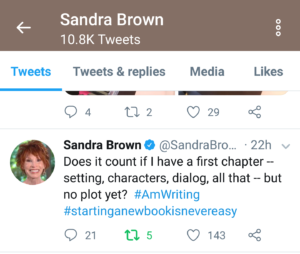
And I am like OMG yes! Sandra Brown, one of my favorite authors of all time, has to start new books just like the rest of us. With a blank page! I mean, I already knew this, but seeing her honestly was such a huge inspiration. And yes, this absolutely counts!
There are all kinds of books and workshops out there about plotting. I love Mary Buckham and what she does, and she offers a plotting workshop that is likely out of this world. I’ve never taken it. Most of these plotting workshops promise to change your writing world, make you a better, faster writer. If I were to take one, I’d probably take hers. But I have to use my experience and avoid plotting at this point at all costs. Once I write the first few scenes or chapters, I can stop and take a good long look at what’s happening but for now if I do that, I will lose a lot of time because I will get too stuck to move. The characters stop whispering.
The other key to writing as a pantser is to read. A lot. Read something so unlike what are writing at the moment.
“Read. A lot. Read something so unlike what you write.”
In my opinion, and maybe it’s because I don’t have a lot of experience as a plotter, but it’s easier to get writer’s block as a pantser. I believe that writer’s block happens when I’m trying to tell the story I want to tell instead of the story my characters want to tell.
In my recently finished novel, which is with my editor at the moment, the very first scene had a sex scene. So unlike most of my writing, but these two characters had a history. I didn’t want to write it. I didn’t write it at first. I ignored my characters because I was too scared to write something so bold. You know what happened?
I got blocked! I got so stuck on that story I couldn’t move forward. At all. Until I went back and rewrote the scene the characters wanted (and I added the sex).
“Writer’s block happens to me when I’m trying to write the story my way instead of how the characters want me to tell it.”
My fifth key to being a pantser and getting past that blank page is the most difficult. Take a breath, take a break, clear your mind, meditate.

We’ve all heard how great meditation is, but it’s hard to stop long enough or be in the mood etc. I’m here to tell you that even 2 minutes of sitting with your eyes closed, no noise, no phone nearby, no interruptions is the best thing you can do for your mental health and getting things out of your head and onto the page. More than two minutes if you can. Because when you have a lot of noise going on in your head, how in the world can you hear anything?
“Take a breath, take a break, clear your mind, meditate.”
To sum it up, my five tips for being a pantser and getting past those blank pages:
- Develop your characters.
- Listen to your characters.
- Read something unlike what you are writing.
- Don’t let fear stop you from writing your story.
- Meditate.
What do you think? Do you have any tips you want to share that work for you? Any questions?
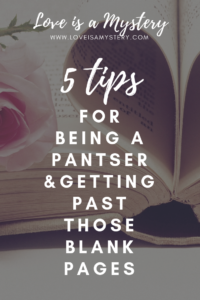
by Angela Smith | Feb 22, 2018 | Introspective, Writing

51359617 -123RF Copyright
Ugh! I hate conflict! What happened to peace and goodwill towards men?
But as I was editing my novel, I realized my hatred for conflict had carried over into my story. I didn’t want conflict in my story. I wanted it to be happy and create joy and make everyone—including me—feel GOOD! To heck with conflict!
But a story needs conflict to survive. Real life, and real goals, are met with daily conflict, whether it’s getting up on time or meeting your goal for the day or what in the world to cook for dinner. (If only the conflict in our daily lives was THAT mild, huh?)
A story is not a story without conflict!
But ugh, conflict is so hard to write! What to do what to do what to do?
To increase the conflict in my story (what kind of real romance is not without conflict even if onlookers think it’s silly), I made several notes. And several revisions. Meanwhile, I thought of real life and all the conflict that entails.
1. Miscommunication. It’s the worst kind of conflict, IMO. So aggravating! I really don’t like using it in my story because I cringe when I read it. I’m like UGH why don’t you guys have a conversation with each other!?! However, miscommunication is real, it is broad, and, although as much as I’d like to say it’s preventable, it isn’t going to stop anytime soon.
a. Really, truly, you should try to have a conversation before you make drastic decisions
b. Most of us are much better speakers than they are listeners. Communication means listening first!
2. Fear. Yes, a lot of conflict revolves around fear. Someone afraid of moving forward, afraid of getting hurt again, or afraid of getting out of their comfort zone. I really had to think about my characters and what they feared most to really increase my conflict.
a. What do you fear? Is something going on in your life where you know you should make a move but you’re too afraid to. Why?
b. Make a list of your fears and why. Most of our fears can be figured out why. I mean, I’m still scared of monsters under my bed because of my aunt always telling me there was a monster under my bed. I don’t even have a bedframe now, thank you. (Okay, I don’t anymore, but that’s not why.)
3. Dramatism. Some of it we can control, some of it we can’t. We can control melodrama and how we react, but we can’t control some of the things that happen in our life. If my character witnesses a terrible crime (she did) or had to fight for survival (she did), the only thing she could control was what she did next and how she reacted. She doesn’t even always have a choice in who she trusts.
a. In this example, melodrama is something we can control. I.E. overreacting, thinking the worst, and even worrying about things that haven’t happened yet and likely never will.
b. Don’t we do that all? Ugh, it’s the worst feeling. I’m trying hard not to do that, but boy does it sure create conflict in stories (and in my own life).
4. Opposing Characteristics. People annoy us. Let’s face it. Although I’m pretty adaptable and friendly, there are some people I just don’t click with. That can create conflict, if it affects your life. In a story, it can definitely create conflict!
a. Some of my favorite stories and favorite characters are those who started out with a love/hate relationship. Although in reality, I believe friendship is the best, seeing how that love/hate relationship is going to conclude is so much fun to write!
b. Experts say that sometimes, the people that absolutely aggravate us have traits similar to our own. Is there someone who aggravates you beyond belief? If so, note those characteristic and WHY. Is it something you’ve seen in yourself that you’d like to change? (Honestly, I’ve never understood or believed it, but give me a shout out if you’ve found it to be true!
Obviously, there are many things in our lives that create conflict. Sometimes it’s simple, but sometimes it’s way beyond our control. I could go on and on (and maybe I will in another post) but this one has been long enough!
And it did help me create more conflict. Nobody lives a conflict free life, especially in fiction or that would just be boring! And fiction can’t feel real without having some sense of realism.
What do you think?
by Angela Smith | Jun 4, 2016 | Writing
My boss recently told me how impressed he was with my fiction writing. It made me nervous. I write romance novels! I don’t need my boss reading that!
Then I remembered that, although I am writing these novels about these characters, they are not me. It’s like being an actor. Jim Carrey is not a pet detective, Christian Bale, as much as we might like to think so, is not Bruce Wayne, and Matt Damon is not Jason Bourne and capable of killing. They are playing characters, and doing a damn fine job, and that’s what being a writer is all about.
Being a writer is like your character speaking through you. Like they have a story to tell, and they are using you as the vessel. Okay, that might be strange heebie jeebie stuff, and it isn’t as strange as it sounds, but believe me when I say it is my characters who tell the story, not me. My characters do go silent on me. They stop talking to me, and then I’m lost in my story, trying to find my way through a really confusing path. It isn’t fun.
As a matter of fact, the ones I’m writing now have done so. I’m trying so hard to tell the story they want me to tell, but I got stuck because I was trying to write things the way I wanted to write them, and not the way the character wanted me to. I think I’ve finally figured it out, but it’s still a really long process trying to weed through those, well, weeds.
So todays writing tip is to listen to your characters! Don’t let other voices get in the way of your voice. You have your own voice, and it usually comes through when you listen to your characters, because they are the ones to ultimately tell the story! If your writing is based on plotting more than character, then listen to the plot, because your plot is your character! And don’t be afraid to go all out. If others don’t approve, well, that’s their tough luck!
by Angela Smith | Apr 23, 2016 | Writing
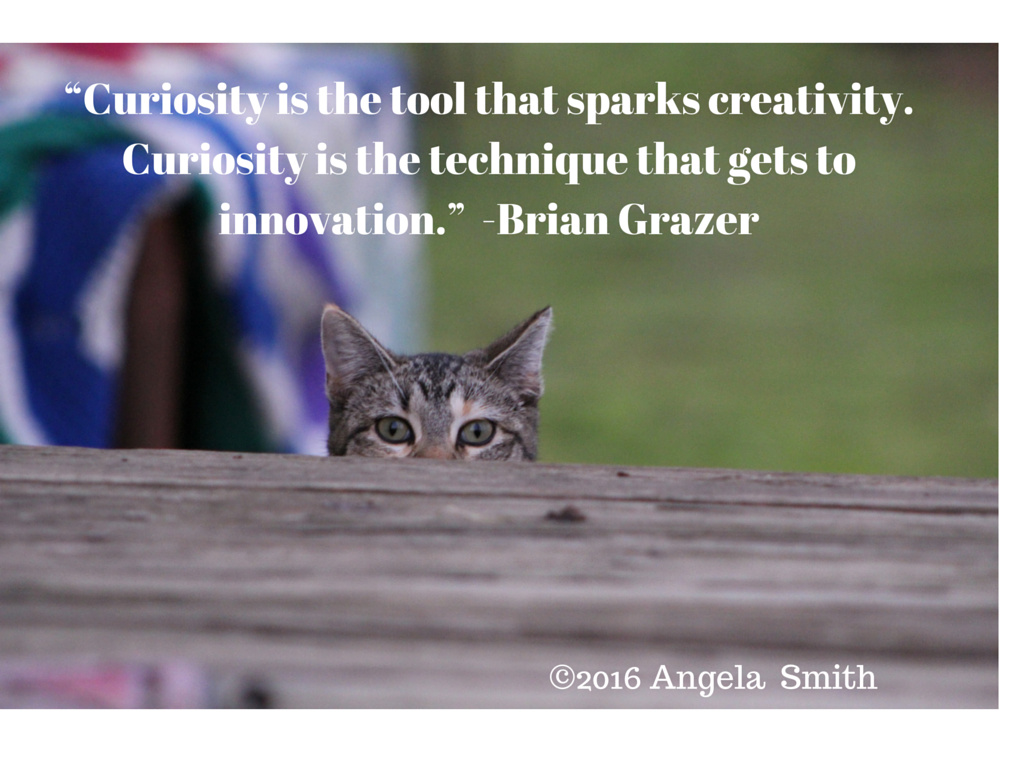
Curiosity hasn’t exactly been advocated as a positive trait to have. Curiosity killed the cat, after all, at least that’s what I’ve always heard.
Most of us are taught at an early age, at least inadvertently, that being curious is dangerous. But being innovative and inquisitive, now those are positive traits.
Is there a difference?
When I was a teenager, and thought I knew everything, my young sister used to annoy me by asking “Why?” It was the four year old question when she was just learning about her world, and yet I told her to stop asking why. I regret that now. Asking why isn’t a bad thing, and I should have been asking that myself.
I recently finished reading A Curious Mind, by Brian Grazer, and I loved it! What a great read on curiosity, leadership and creativity. Not much has changed about the fear of curiosity, and yet it is the reason today we have so many changes in our life. New cell phones in production at every turn. Movies and books and paintings, etc. They are all bred by curiosity, we just don’t always give it the power it deserves.
I work in the law field, which is built from curiosity, and yet we don’t acknowledge that. We are curious how a crime was committed, and yet the main goal becomes proving it was committed. It’s a very scientific field that sometimes robs me of my creativity, and yet it’s one of the most scientifically creative fields out there, to prove how a crime was committed. A huge puzzle.
Authors have to be curious. Curious authors are good authors, and yet they might not admit that term. I never did, until after reading that book.
I’m not what I’d consider a naturally curious person. I’ve always enjoyed learning new things but never considered myself curious. And yet “innovation is built from curiosity”.
So today, my writers tip is to be more curious. Curiosity can be simple. We don’t have to solve all of life’s problems, and we might not ever get to be as curious as Brian Grazer, the co-owner, with Ron Howard, of Imagine Entertainment. But curiosity breeds creativity, innovation, and even leadership. So don’t be afraid to be curious!
by Angela Smith | Mar 26, 2016 | Introspective, Writing
I can’t believe it’s been a month since my last post! So many things have happened. Hubby and I have been busy with our remodel, working full time, and my writing. I have a new contract for a new book, and we’re getting ready for a pretty big trial at work.
I took a vacation this past week to just try to get some stuff done at home, on my story, and a little free time for myself before I had a major burn out at work. Which was close, believe me. Some days, you just need to take some time off and get away from it all, but hubby and I couldn’t take an actual vacation at this time. He would still be working, and it wasn’t good timing for us.
I had plans and goals for my days off, even plotted out the rest of my story (which is basically unheard of in my world), but I was quickly struck, quite literally, with the realization that none of that mattered. I had a small injury/accident that could have been huge, but it took me away from my writing for a few days. Not only that, but once I got the ability to write again, I didn’t want to. I have these 3 ideas, trying to work on most of them, and I had absolutely no interest. There were moments I just sat staring at the sky. It was those moments I realized I needed the most. When I told my husband I should be doing this and that and I’m not getting any work on the house (remodeling) done, he reminded me of why I fell in love with him. He told me it’s my vacation, and that I shouldn’t feel like I should be accomplishing something every hour. I could write something outside of my interest, like horror, or I should be doing something like a hobby, or a nap. A nap? What in the world is a nap? And I was so close to burn out that I had forgotten what a hobby even was, or how to enjoy one.
But alas, the downtime helped tremendously. I surrounded myself with peace and quiet, with positive self-talk, yoga, and even positive podcasts, and lots of Vitamin D. I had a doctor appointment on one of those days, and treated myself to a hair appointment, and wrote some on my phone. Something I’d never been able to do before either. After all, I need my office and a computer, or at least the outdoors and a notebook. I got outside my comfort zone, several times, and that’s exactly what I needed.
So my writing tip of the day is to get outside of your comfort zone. Go somewhere different. Even if it’s a day, a half day, or an hour. If you have a town river and an hour lunch break, go there for lunch (something I used to do all the time that I no longer do). If you work full time and write, it’s really, really hard. If you work full time and do anything, it’s really, really hard.
My husband and I were able to take a half a day off and go Jeeping off-road, something we love to do that we haven’t done in a long time. It was a fabulous break, but the break I had, all alone during the week, was just what I needed to get my head back on straight so that I could actually enjoy this day trip. So if you’re feeling burned out from writing or work or anything, don’t be afraid to take a break. For writers, the pressure to write every day, to produce something every few months, is overwhelming, sometimes to the point of never getting started. If you can only write a book a year, it’s something! So don’t be afraid to take breaks!


One more thing I learned while on vacation. I spent a lot of times outdoors with the cats I take care of. They have taught me so much over the years, but the one thing I leave you with today is:
Cats are always eager! Eager to explore, eat, taste, relish life, experience, and especially play! So be eager to experience life and to do new things.
And if you get stuck, be eager to dig yourself out, even if the path is a bit rocky! Either that, or just get on that rock and kick back for a while!
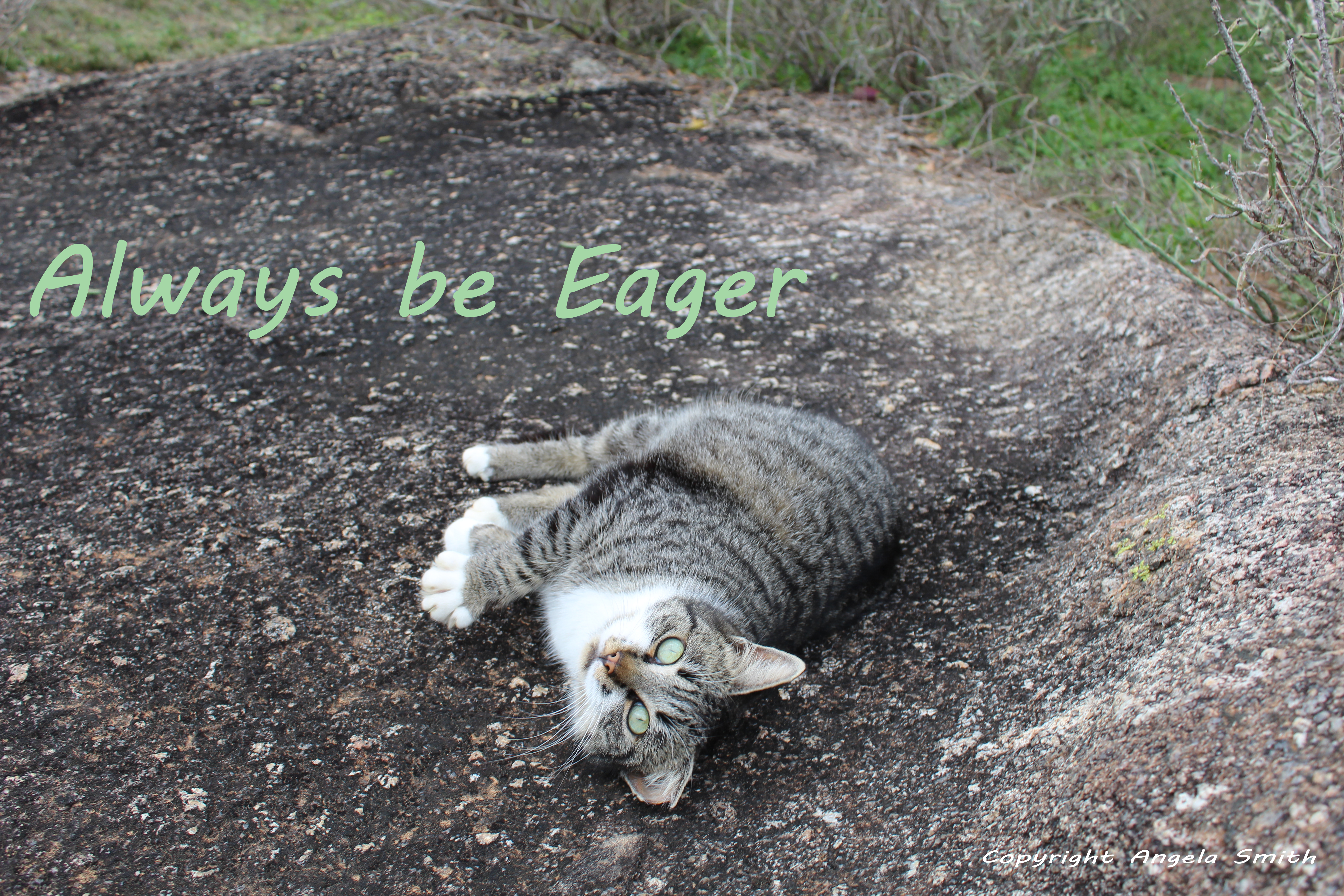
by Angela Smith | Feb 27, 2016 | Writing
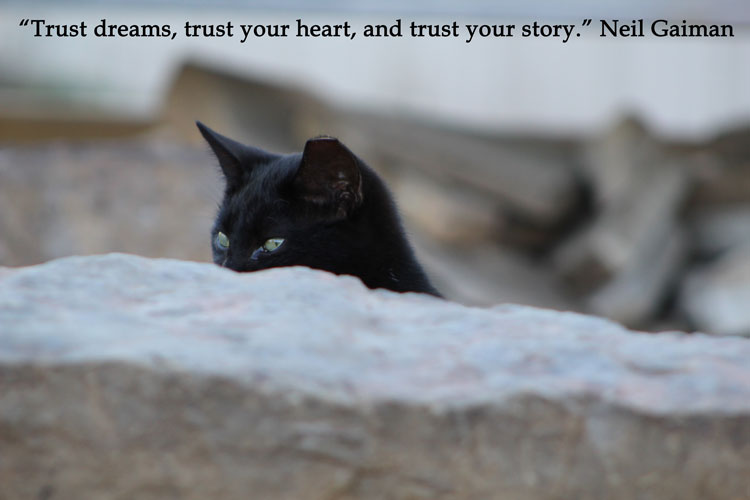
Welcome to Writersday! Okay, it was supposed to be a weekly post, but I have recognized my limits and realized there is no way I can make a post about writing (or possibly any post) once a week. So now Writersday will be the last Saturday of the month! (For now, anyway.)
This Writersday, I want to talk about limitations. The limitations we put on ourselves, on others, and the limitations others put on us (or, at least, we feel they are putting on us).
As a writer, I have felt the heavy weight of limitations. Every time someone asks me about my writing, I feel they are asking only because they are judging. I postponed my dream for years because of those constraints and the fear of being judged. Then I realized I didn’t care what anyone else thought. Once I “got out of the closet” so to speak, I realized many people actually supported me! And those that didn’t? There’s something wrong with them, obviously.
Hey, going after your dream is never easy. There’re plenty of quotes to remind us. For me, I love my job (of non-writing), but I also love my writing. I have to find a balance (getting up early, sometimes staying up late, and sometimes just being too darn tired to write). Having a full time job does make marketing much harder (time, effort, and apprehension), but there’s no explanation (at least right now) of how it feels when a scene comes together.
Writing is an art, like painting, drawing, photography, music, or any other art form. We all feel judged and adjudicated when it comes to our art. Some people will like it, and some will never understand it. That’s when I have to do like Neil Gaimain said and “Trust dreams, trust your heart, and trust your story.” Trusting isn’t always easy, but, at least when it comes to our writing, we have to trust ourselves.
I don’t write to make a ton of money. If I did, maybe I’d be writing these awesome books that get a lot of attention. That’s usually the luck of the draw, anyway. No, I write stories that make me happy, that I, myself, love to read. What writer wouldn’t love to be the next Nora, King, or Koontz? And many bad news out there for authors about publishers closing down doors or sales being too low to sustain their business. So my tip for the day is to write what you love. If the money doesn’t follow, you’ll still feel fulfilled.
That’s my opinion, anyway. I hope it helps!












